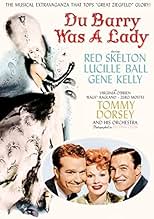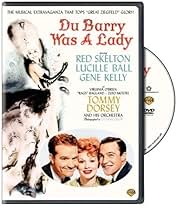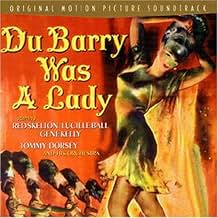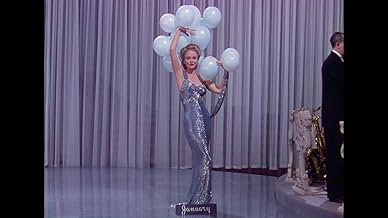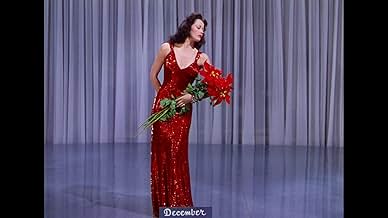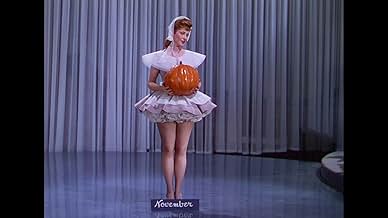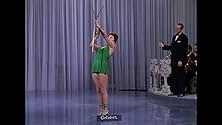ÉVALUATION IMDb
6,2/10
1,8 k
MA NOTE
Un gardien de vestiaire de boîte de nuit amoureux du chanteur du club sirote accidentellement une boisson droguée qui lui fait rêver qu'il est le roi de France Louis XV courtisant la tristem... Tout lireUn gardien de vestiaire de boîte de nuit amoureux du chanteur du club sirote accidentellement une boisson droguée qui lui fait rêver qu'il est le roi de France Louis XV courtisant la tristement célèbre Madame Du Barry.Un gardien de vestiaire de boîte de nuit amoureux du chanteur du club sirote accidentellement une boisson droguée qui lui fait rêver qu'il est le roi de France Louis XV courtisant la tristement célèbre Madame Du Barry.
- Prix
- 1 victoire au total
Rags Ragland
- Charlie
- (as 'Rags' Ragland)
- …
Richard Ainley
- Marching Rebel Behind King Louis
- (uncredited)
Grace Albertson
- Perfume Girl
- (uncredited)
Kay Aldridge
- Mrs. McGowan
- (uncredited)
Ernie Alexander
- Delivery Man with Flowers
- (uncredited)
Avis en vedette
Most people who know of Lucille Ball's career arc are aware that this was one of her higher-profile films, with a large budget, vibrant color, and A-list co-stars. What could go wrong? Well, nothing at the time. But with the passage of time the movie has gotten a bit stale, and drags in several parts. Ball's materialistic character is not very likable from the start, and she's introduced in a ghastly musical number with very conspicuously dubbed vocals. Couldn't they have found someone who's voice actually sounded like it could possibly be coming out of Lucille Ball?
They should have cast Ethel Merman, who played May Daly on Broadway. After all, the character didn't HAVE to be drop dead gorgeous. But it does help explain why two men would continue to pursue such an obviously shallow diva, even if she can't really sing.
The main event of this film is a dream sequence, but the setup to that point seems interminable! And all we have to keep us watching in between is one outstanding dance number by a game Gene Kelly and mildly witty banter between Red Skelton and an underused Virginia O'Brien. Skelton would be much better later in his career by toning down the Vaudevillesque physical comedy, which only appears more cloyingly corny with age. (Bert Lahr, who played the stage role was the same way.) There is also a musical interlude with three gentlemen who do vocal impressions that will definitely have you pushing the fast-forward button on your remote.
If you have the patience, there are some enjoyable musical numbers and just a few genuine laughs to keep you amused. The funniest line by far in the film is delivered by uncredited old lady Clara Blandick (Auntie Em from "The Wizard of Oz") in one of the Cleanest Subway Cars Ever to be used as a movie setting. That says it all about the dialogue between the leads. (The reason being is the good stuff from the Broadway show was deemed too lewd for the film.)
Obviously a lot went into the costumes and scenery for this film, and that alone makes it worth watching, as well as for the cast members who are always worth watching even if this isn't their best by any stretch.
They should have cast Ethel Merman, who played May Daly on Broadway. After all, the character didn't HAVE to be drop dead gorgeous. But it does help explain why two men would continue to pursue such an obviously shallow diva, even if she can't really sing.
The main event of this film is a dream sequence, but the setup to that point seems interminable! And all we have to keep us watching in between is one outstanding dance number by a game Gene Kelly and mildly witty banter between Red Skelton and an underused Virginia O'Brien. Skelton would be much better later in his career by toning down the Vaudevillesque physical comedy, which only appears more cloyingly corny with age. (Bert Lahr, who played the stage role was the same way.) There is also a musical interlude with three gentlemen who do vocal impressions that will definitely have you pushing the fast-forward button on your remote.
If you have the patience, there are some enjoyable musical numbers and just a few genuine laughs to keep you amused. The funniest line by far in the film is delivered by uncredited old lady Clara Blandick (Auntie Em from "The Wizard of Oz") in one of the Cleanest Subway Cars Ever to be used as a movie setting. That says it all about the dialogue between the leads. (The reason being is the good stuff from the Broadway show was deemed too lewd for the film.)
Obviously a lot went into the costumes and scenery for this film, and that alone makes it worth watching, as well as for the cast members who are always worth watching even if this isn't their best by any stretch.
This 1943 Arthur Freed production had a great cast, gorgeous Technicolor, various personalities of the day like Tommy Dorsey (and Dick Haymes and Jo Stafford singing in the flashback sequence), but it's a rather boring film. It's a movie made for a person with the intellect of a fifth grader. I had to stop the film after an hour and watch it the next day to complete it, as my patience had reached its limit for the day. I will say that many musicals of the day had puerile plots, but this one really was on the lower half of the scale.
Lucy and Red, both talented, didn't strike me as all that funny. And Lucy singing with Rita Hayworth's voice double Martha Mears looked and sounded strange. When you're looking for Rita, and you get Lucy, it is quite the shock. I will admit that after checking my facts Martha sang for Lucy before she sang for Rita in Cover Girl one year later, but I still "heard" Rita singing.
Gene was good as always but I couldn't quite see why he wanted Lucy so much. She was beautiful but cold in an icy manner.
Clara "Auntie Em" Blandick had a small bit in a subway which was quite good. And Lana Turner also appears in the film in an uncredited cameo.
Virginia O'Brien, always fun, helped the proceedings as well.
If you're a fan of the MGM musical, you should see it, but it's not a film that will make a list of the top film musicals.
Lucy and Red, both talented, didn't strike me as all that funny. And Lucy singing with Rita Hayworth's voice double Martha Mears looked and sounded strange. When you're looking for Rita, and you get Lucy, it is quite the shock. I will admit that after checking my facts Martha sang for Lucy before she sang for Rita in Cover Girl one year later, but I still "heard" Rita singing.
Gene was good as always but I couldn't quite see why he wanted Lucy so much. She was beautiful but cold in an icy manner.
Clara "Auntie Em" Blandick had a small bit in a subway which was quite good. And Lana Turner also appears in the film in an uncredited cameo.
Virginia O'Brien, always fun, helped the proceedings as well.
If you're a fan of the MGM musical, you should see it, but it's not a film that will make a list of the top film musicals.
Nightclub singer dreams of marrying into money but is in love with a poor fellow. Fluffy musical comedy plays like a variety show, with minimal plot holding together musical numbers and comedy skits. The film looks good in Technicolor, with red hairs of Skelton and Ball (dyed for this film and kept so thereafter) featured prominently. It's nothing special, but it's not terribly painful to watch either. Lucy mostly plays it straight while Skelton provides the comedy as a hat check man who wins the sweepstakes and woos Lucy. In only his second film, Kelly completes an unlikely love triangle as Lucy's poor and sullen boyfriend.
The Roy Del Ruth directed romp "Du Barry Was Lady" from 1943 I suggest is one of the most imitated of all cinematic musicals. Its sincere main storyline involving dancer lovestruck Gene Kelly with gorgeous Lucille Ball and funnnyman Red Skelton with Virginia O'Brien is solidly presented. But this Sam Goldwyn style extravagance then blossoms out to include an extended dream-fantasy sequence. The later frenetic pageant stars all the characters in a royal French misadventure with Kelly as a rebel against the corrupt King, Ball as the infamous Du Barry who falls for the handsome "Black Arrow", her chief enemy, and Red Skelton as the dreamer and inept french King Louis XV. The immense cast also includes Rags Ragland, an early Zero Mostel as the Swami, powerful Douglass Dumbrille as Kelly's rival, Donald Meek, George Givot, talented actress Louise Beavers as a lovable but bossy maid, Niagara, and the Tommy Dorsey orchestra with the Pied Pipers, at this time including Dick Haymes and Jo Stafford, plus the Goldwyn Girls. The script for this expensive and lovely musical excuse for two hours' entertainment was supplied from a play by Herbert Fields and Buddy DeSylva, adapted by Nancy Hamilton. the screenplay was provided by Irving Brecher, with additional dialogue by Wilkie Mahoney. If the viewer looks closely, one can perhaps spot Marilyn Maxwell as a Goldwyn Girl, Ava Gardner (somwhere in the background), and fine actors Emory Parnell, Kay Aldridge and Grace Albertson in bit parts. Dorsey's orchestra is given several fine numbers, featuring his many talented sidemen. But the film belongs to the Kelly-Ball mismatch and to Red Skelton, being pursued by O'Brien. The producer was Arthur Freed, who employed Karl Freund's lucid cinematography, memorable art direction of the great Cedric Gibbons, Edmund Willis's elaborate set decorations done with Henry Grace, Gile Steel's male costumes and lovely female counterparts designed by Irene Sharaff, Sydney Guilaroff's difficult hair styles and Jack Dawn's inspired makeup. Music I suggest dominates much of the film; so, mention should be made of the orchestrations by Leo Arnaud and Axel Stordahl, done with George Bassman and music adaptor Roger Edens. Sy Oliver was also involved in orchestrations along with musical director George E. Stoll. Charles Waters is credited with the choreography, including several very fine production numbers. After not having seen the film for many years, I found its theatrical basis only a bit confining--the entire main film takes place in a large nightclub the performances more than adequate and the technicolor of this production absolutely lovely. Ball is much better in the French dream sequence I judge than in the more dramatic central plot; Kelly and Skelton acquit themselves very winningly; and Dumbrille and Mostel dominate every scene they are allowed to play. This can be a most enjoyable film, I suggest, for those in the mood for pure entertainment with a stronger story line than is usual for such 1930s and 1940s extravaganzas staged by Hollywood's studio tsars.
MGM bought a seventeen song musical comedy, threw out thirteen songs ("It Ain't Etiquette", "Well, Did You Evah", and "But In The Morning, No" can still be heard as backg round music) and had five studio composers take care of the rest of the score ("Salome" is their best contribution).
The plot--Film takes place in a nightclub. Louis (Skelton) is in love with May (Lucille Ball). After he accidentally drinks a Mickey, he dreams he's back in 1743 France, where he is Louis XV, and May is Madame DuBarry.
To me, Skelton is unbearable when he plays stupid; here, he takes forever to get the idea he's back in France, and tramples jokes into the ground. I don't know if that's his fault or the fault of director Del Ruth.
Ball is good as May/Madame DuBarry. She saves the second half of the film with her comedy skills where she makes a fool out of Louis XV. She is dubbed for most of her songs, but her real voice can be heard in the song "Friendship".
Gene Kelly is good as Alec/The Black Arrow. He has the best song ("Do I Love You") and an excellent dance number on the nightclub stage.
Virginia O'Brien makes "Salome" a memorable song. Look for Marilyn Maxwell in a bit , and Lana Turner in an uncredited bit.
The plot--Film takes place in a nightclub. Louis (Skelton) is in love with May (Lucille Ball). After he accidentally drinks a Mickey, he dreams he's back in 1743 France, where he is Louis XV, and May is Madame DuBarry.
To me, Skelton is unbearable when he plays stupid; here, he takes forever to get the idea he's back in France, and tramples jokes into the ground. I don't know if that's his fault or the fault of director Del Ruth.
Ball is good as May/Madame DuBarry. She saves the second half of the film with her comedy skills where she makes a fool out of Louis XV. She is dubbed for most of her songs, but her real voice can be heard in the song "Friendship".
Gene Kelly is good as Alec/The Black Arrow. He has the best song ("Do I Love You") and an excellent dance number on the nightclub stage.
Virginia O'Brien makes "Salome" a memorable song. Look for Marilyn Maxwell in a bit , and Lana Turner in an uncredited bit.
Le saviez-vous
- AnecdotesMGM hairstylist Sydney Guilaroff dyed Lucille Ball's hair flame red for this film, the color that she kept for the rest of her life and became her trademark.
- GaffesDuring the scene in Madame Du Barry's boudoir when King Louis XV is chasing Du Barry around the dressing table, a man sitting in a chair can be seen reflected in the mirror.
- Générique farfeluThe Three Oxford Boys are credited orally by the MC ('Gene Kelly') as The Oxford Boys.
- Autres versionsThis film was published in Italy in an DVD anthology entitled "Cover Girl", distributed by DNA Srl. The film has been re-edited with the contribution of the film history scholar Riccardo Cusin . This version is also available in streaming on some platforms.
- ConnexionsEdited into American Masters: Gene Kelly: Anatomy of a Dancer (2002)
- Bandes originalesDu Barry Was a Lady
(1943)
Music by Burton Lane
Lyrics by Ralph Freed
Played during the opening credits
Sung by Lucille Ball (dubbed by Martha Mears) and chorus at the nightclub
Meilleurs choix
Connectez-vous pour évaluer et surveiller les recommandations personnalisées
Détails
- Date de sortie
- Pays d’origine
- Langue
- Aussi connu sous le nom de
- La Dubarry era una dama
- Lieux de tournage
- société de production
- Consultez plus de crédits d'entreprise sur IMDbPro
Box-office
- Budget
- 1 239 222 $ US (estimation)
- Durée
- 1h 41m(101 min)
- Rapport de forme
- 1.33 : 1
Contribuer à cette page
Suggérer une modification ou ajouter du contenu manquant


